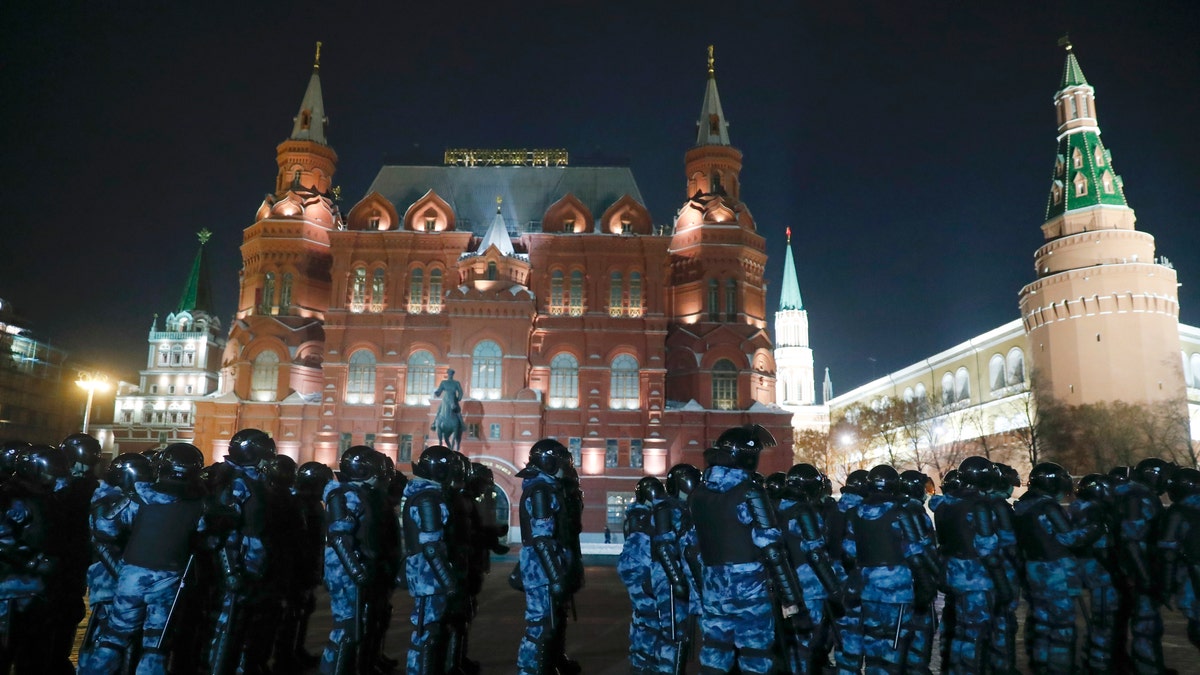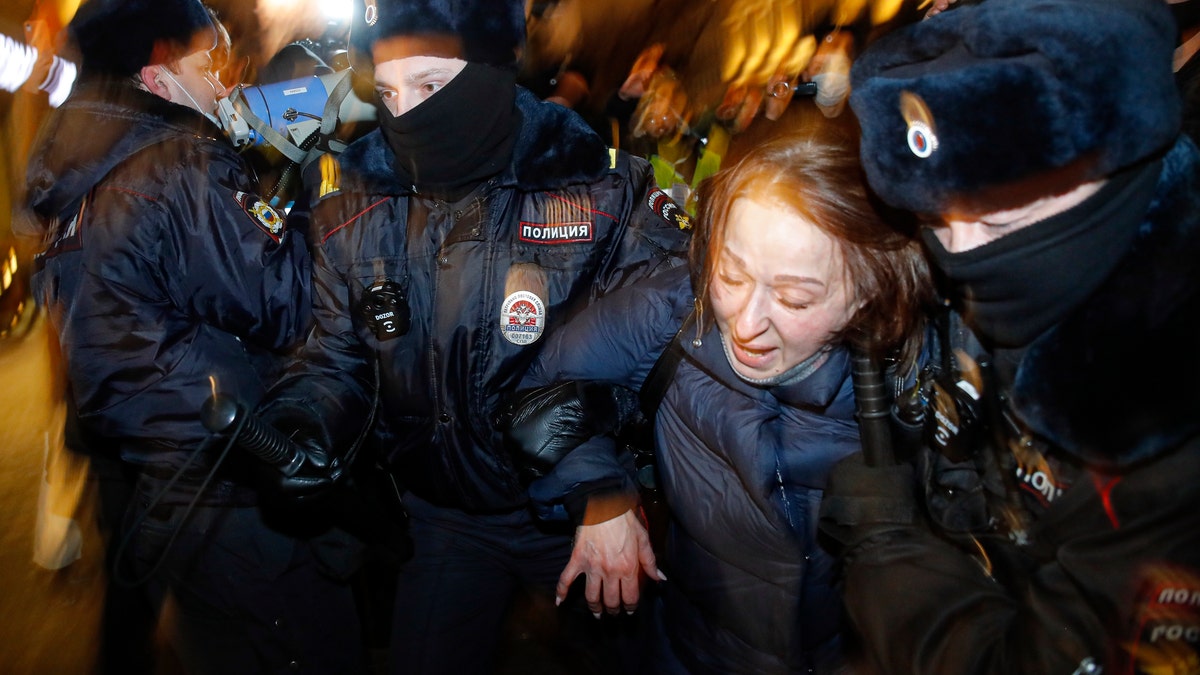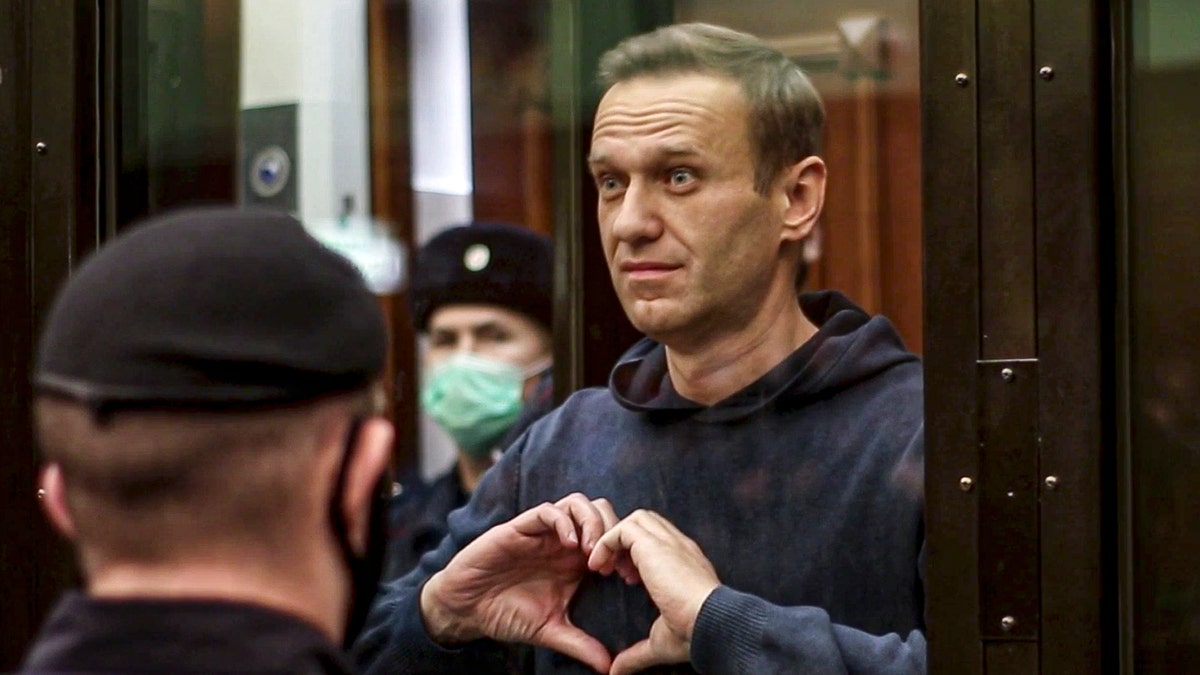Biden admin faces foreign policy challenges from Russia to Burma
Correspondent Rich Edson has the latest from the State Department on 'Special Report'
MOSCOW – The Kremlin said Thursday that thousands of arrests at protests against the jailing of opposition leader Alexei Navalny were a necessary response to the unsanctioned rallies and strongly rebuffed Western criticism.
Asked about the harsh treatment of thousands of detainees, many of whom spent long hours on police buses and were put in overcrowded cells, Russian President Vladimir Putin's spokesman, Dmitry Peskov, said they have to bear responsibility for joining the unauthorized protests.
"The situation wasn't provoked by law enforcement, it was provoked by participants in unsanctioned actions," Peskov said in a call with reporters.

FILE - In this Tuesday, Feb. 2, 2021 file photo, servicemen of the Russian National Guard (Rosgvardia) gather at the Red Square to prevent a protest rally in Moscow, Russia. A prison sentence for Russian opposition leader Alexei Navalny and a sweeping crackdown on protesters demanding his release reflect the Kremlin’s steely determination to fend off threats to its political monopoly at any cost. (AP Photo/Pavel Golovkin, File)
Massive protests erupted after Navalny, a 44-year-old anti-corruption campaigner who is Putin’s most determined political foe, was arrested Jan. 17 upon returning from his five-month convalescence in Germany from a nerve agent poisoning, which he has blamed on the Kremlin. Russian authorities deny any involvement and claim they have no proof that he was poisoned despite tests by several European labs.
UKRAINE SHUTS TV CHANNELS OWNED BY RUSSIA-FRIENDLY TYCOON
A Moscow court on Tuesday ordered Navalny to prison for two years and eight months, finding that he violated the terms of his probation while recuperating in Germany, a ruling that caused international outrage and triggered new protests in Moscow and St. Petersburg.

FILE In this Tuesday, Feb. 2, 2021 file photo, a demonstrator holds a Russian national flag during a protest after Russian opposition leader Alexei Navalny was sentenced to jail in Moscow, Russia. A prison sentence for Russian opposition leader Alexei Navalny and a sweeping crackdown on protesters demanding his release reflect the Kremlin’s steely determination to fend off threats to its political monopoly at any cost. (AP Photo/Pavel Golovkin, File)
Following Navalny's arrest, authorities also have moved swiftly to silence and isolate his allies. Last week, a Moscow court put his brother, Oleg, top associate Lyubov Sobol, and several other key allies under house arrest – without access to the internet – for two months as part of a criminal probe into alleged violations of coronavirus restrictions during protests.
CANADA DESIGNATES THE PROUD BOYS AS A TERRORIST ENTITY
On Thursday, Sobol was formally charged with the incitement of violation of sanitary regulations by organizing protests.

FILE - In this Tuesday, Feb. 2, 2021 file photo, police officers detain a Navalny supporter during a protest in St. Petersburg, Russia. A prison sentence for Russian opposition leader Alexei Navalny and a sweeping crackdown on protesters demanding his release reflect the Kremlin’s steely determination to fend off threats to its political monopoly at any cost. (AP Photo/Dmitri Lovetsky, File)
Protests have spread across Russia's 11 time zones over the past two weekends, drawing tens of thousands in the largest show of discontent with Putin's rule in years.
RIGHTS GROUPS CALL FOR BOYCOTT OF BEIJING 2022 WINTER GAMES
In a no-holds-barred response to the protest, police arrested over 10,000 protest participants across Russia and beat scores, according to the OVD-Info group monitoring arrests. Many detainees had to spend hours on police buses after detention facilities in Moscow and St. Petersburg quickly ran out of space and later were crammed into cells intended to accommodate far fewer inmates.

FILE - In this handout photo taken from a footage provided by Moscow City Court on Tuesday, Feb. 2, 2021, Russian opposition leader Alexei Navalny shows a heard symbol standing in the cage during a hearing to a motion from the Russian prison service to convert the suspended sentence of Navalny from the 2014 criminal conviction into a real prison term in the Moscow City Court in Moscow, Russia. A prison sentence for Navalny and a sweeping crackdown on protesters demanding his release reflect the Kremlin’s steely determination to fend off threats to its political monopoly at any cost. (Moscow City Court via AP, File)
One detainee, Almir Shamasov, who spent 10 days at a detention facility in Sakharovo outside Moscow, said he spent 20 hours in a police van suffering from engine fumes or shivering cold when it was cut off.
BURMA BLOCKS FACEBOOK AS RESISTANCE TO COUP SURGES
"While we were driving, staying, the whole day passed," he said after being freed late Wednesday. "When you sit inside a police van with engine and heat on, the smell of gas or diesel fuel is unbearable. When it’s off, the steam comes out of your mouth."
Peskov, the Kremlin spokesman, shrugged off questions about detainees waiting on police buses and being squeezed into cramped cells by saying they had themselves to blame.
"The number of detainees is larger than detention facilities can handle. It's larger than what could be quickly processed, and that, unfortunately, causes such consequences," Peskov said. "Above all, these are the people who took part in unlawful actions."
He said that Russia won't listen to Western criticism of Navalny's sentencing and police action against protesters.
CLICK HERE TO GET THE FOX NEWS APP
"We aren't going to take into account such statements regarding the enforcement of our laws on those who violate them and Russian court verdicts," Peskov said.









































